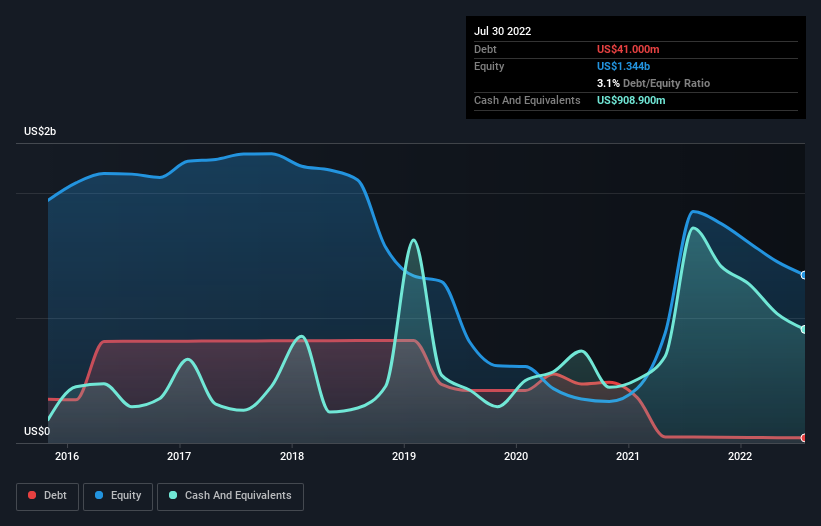
Some say volatility, rather than debt, is the best way to think about risk as an investor, but Warren Buffett famously said that 'Volatility is far from synonymous with risk.' It's only natural to consider a company's balance sheet when you examine how risky it is, since debt is often involved when a business collapses. As with many other companies GameStop Corp. (NYSE:GME) makes use of debt. But is this debt a concern to shareholders?
When Is Debt A Problem?
Debt and other liabilities become risky for a business when it cannot easily fulfill those obligations, either with free cash flow or by raising capital at an attractive price. Ultimately, if the company can't fulfill its legal obligations to repay debt, shareholders could walk away with nothing. However, a more usual (but still expensive) situation is where a company must dilute shareholders at a cheap share price simply to get debt under control. By replacing dilution, though, debt can be an extremely good tool for businesses that need capital to invest in growth at high rates of return. The first step when considering a company's debt levels is to consider its cash and debt together.
See our latest analysis for GameStop
What Is GameStop's Net Debt?
The image below, which you can click on for greater detail, shows that GameStop had debt of US$41.0m at the end of July 2022, a reduction from US$47.5m over a year. However, it does have US$908.9m in cash offsetting this, leading to net cash of US$867.9m.

How Healthy Is GameStop's Balance Sheet?
According to the last reported balance sheet, GameStop had liabilities of US$932.4m due within 12 months, and liabilities of US$523.6m due beyond 12 months. On the other hand, it had cash of US$908.9m and US$268.2m worth of receivables due within a year. So its liabilities outweigh the sum of its cash and (near-term) receivables by US$278.9m.
Of course, GameStop has a market capitalization of US$8.67b, so these liabilities are probably manageable. However, we do think it is worth keeping an eye on its balance sheet strength, as it may change over time. Despite its noteworthy liabilities, GameStop boasts net cash, so it's fair to say it does not have a heavy debt load! The balance sheet is clearly the area to focus on when you are analysing debt. But it is future earnings, more than anything, that will determine GameStop's ability to maintain a healthy balance sheet going forward. So if you're focused on the future you can check out this free report showing analyst profit forecasts.
In the last year GameStop wasn't profitable at an EBIT level, but managed to grow its revenue by 8.6%, to US$6.1b. That rate of growth is a bit slow for our taste, but it takes all types to make a world.
So How Risky Is GameStop?
We have no doubt that loss making companies are, in general, riskier than profitable ones. And we do note that GameStop had an earnings before interest and tax (EBIT) loss, over the last year. Indeed, in that time it burnt through US$876m of cash and made a loss of US$520m. With only US$867.9m on the balance sheet, it would appear that its going to need to raise capital again soon. Summing up, we're a little skeptical of this one, as it seems fairly risky in the absence of free cashflow. The balance sheet is clearly the area to focus on when you are analysing debt. However, not all investment risk resides within the balance sheet - far from it. These risks can be hard to spot. Every company has them, and we've spotted 2 warning signs for GameStop (of which 1 shouldn't be ignored!) you should know about.
Of course, if you're the type of investor who prefers buying stocks without the burden of debt, then don't hesitate to discover our exclusive list of net cash growth stocks, today.
New: Manage All Your Stock Portfolios in One Place
We've created the ultimate portfolio companion for stock investors, and it's free.
• Connect an unlimited number of Portfolios and see your total in one currency
• Be alerted to new Warning Signs or Risks via email or mobile
• Track the Fair Value of your stocks
Have feedback on this article? Concerned about the content? Get in touch with us directly. Alternatively, email editorial-team (at) simplywallst.com.
This article by Simply Wall St is general in nature. We provide commentary based on historical data and analyst forecasts only using an unbiased methodology and our articles are not intended to be financial advice. It does not constitute a recommendation to buy or sell any stock, and does not take account of your objectives, or your financial situation. We aim to bring you long-term focused analysis driven by fundamental data. Note that our analysis may not factor in the latest price-sensitive company announcements or qualitative material. Simply Wall St has no position in any stocks mentioned.
About NYSE:GME
GameStop
A specialty retailer, provides games and entertainment products through its stores and ecommerce platforms in the United States, Canada, Australia, and Europe.
Excellent balance sheet with questionable track record.
Similar Companies
Market Insights
Community Narratives




